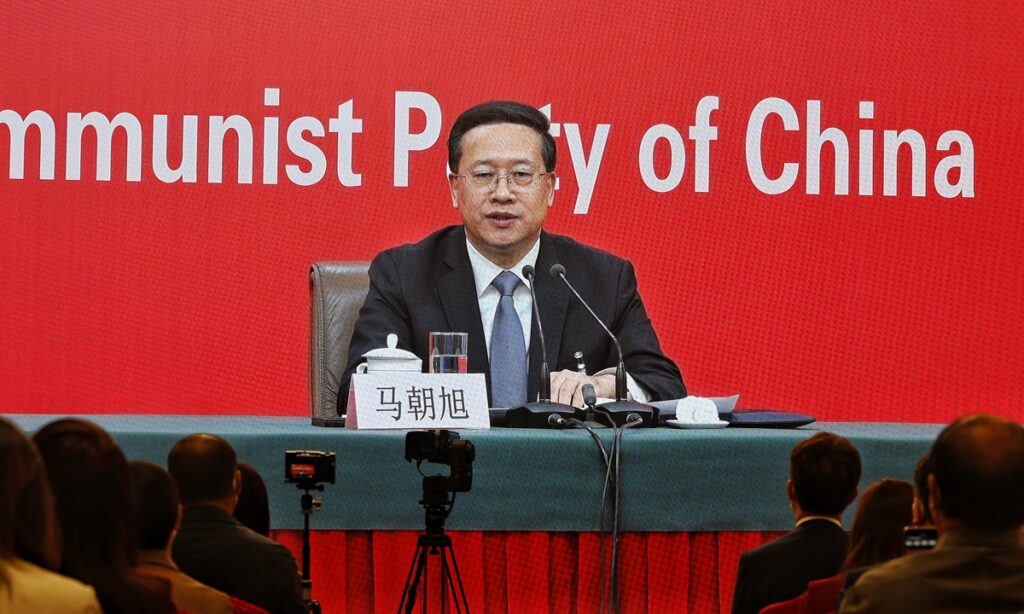The press center for the 20th National Congress of the Communist Party of China (CPC) hosted the fourth press conference Thursday, expounding the Party’s foreign work in the new era and major-country diplomacy with Chinese characteristics. When answering a question from a Global Times reporter about how China’s diplomacy reflects a fighting spirit in safeguarding national sovereignty, security and development interests, Ma Zhaoxu, member of the CPC Committee of the Ministry of Foreign Affairs and Vice Minister of Foreign Affairs, said that daring to fight and being good at fighting are the fine traditions and distinctive features of China’s diplomacy. On the new journey, China’s diplomacy will continue to carry forward the fighting spirit, improve fighting skills, and always stand at the forefront of safeguarding national interests and dignity, he added. These words are powerful and will help deepen the outside world’s comprehensive understanding of China’s diplomacy in the new era.
Since the 18th National Congress of the CPC, “fighting” has increasingly become a high-frequency word and keyword in China’s diplomacy, and it is also a word that has been misunderstood a lot by the outside world. US and Western public opinion has labeled China’s diplomacy such as “wolf warrior”, as one of the foot notes to hype the so-called China threat theory. They deliberately distort the fighting spirit of China’s diplomacy, and by distorting the concept, they try to turn it from China’s just act of defending the country’s dignity and interests, as well as international rules and principles, into an aggressive and destructive diplomatic symbol. Washington even wants to label China with which itself deserves.
Why does China’s diplomacy stress the fighting spirit? The reason is obvious. Those forces who smear and accuse China’s diplomatic efforts of so-called “wolf warrior,” are actually “evil wolves” themselves. Look at the US warships and warplanes which frequently provoke in the waters around China, and the suppressive measures aiming at containing China that Washington launched one after another, the collusion between separatists and external forces, and certain developed countries try to gang up internationally and restart the cold war. All this undoubtedly require China to carry out diplomatic fight.
Obviously, we are fighting against words and deeds that harm China’s national interests and dignity, and against hegemonism and power politics. Some crossed the line and as they provoked, they attempted to sound out. Only by resolutely fighting against them can the boundary, bottom line and red line be defined, forming respect and awe toward China’s national interest and dignity. To put it bluntly, this kind of “dare to fight and be good at fighting” has the defensive characteristics of defending the legitimate interests of the country. It is a necessary posture to prevent adventurous actions by a few powers, which is fundamentally different from the aggressive offensive of the US and the West.
Without the spirit of “daring to fight and be good at fighting,” the US-launched trade war with China would not be what it is today, and Huawei’s Meng Wanzhou, who was illegally detained, would not be able to “unprecedentedly” return home smoothly, the “Taiwan independence” forces would be even more arrogant and the frontier areas may fall into the mire of extremism and terrorism. At the same time as some people in the US and the West accuse China of being “aggressive,” Chinese society fully support the diplomatic work to safeguard national interests, and the international community sincerely appreciates China as a builder of world peace, a contributor to global development, a defender of the international order and a mediator of hotspot issues. This also suggests that justice lies in the heart of people.
The strongest reaction to the fighting spirit of China’s diplomacy comes from the US and Western public opinion and some political elites. This shows that only those with sinister motives will be irritated. How many of China’s partners feel threatened and uneasy from China’s diplomacy? Even if Washington is sparing no effort to sow discord around the world, what other countries are concerned about is actually the consequences of such actions and the pressure from the US. Fighting is a necessary form of Chinese diplomacy, which is important means to seek cooperation and avoid conflicts, and often creates preconditions for cooperation in reality.
There is a mild, reserved and introverted aspect of traditional Chinese culture, which is meanwhile also embodied in the style of China’s diplomatic work. However, self-restraint is in no way a sign of China’s submission to powerful forces. Chinese people not believe in fallacy nor are we afraid of evil forces. We’ll advance despite difficulties. The determination to defend national sovereignty and territorial integrity and safeguard the fundamental development interests of the Chinese nation is unshakable and rock-solid. Dare to fight reflects the diplomatic understanding and will, while being good at fighting tests diplomatic wisdom and steadiness. The purpose and goal of China’s foreign policy is very clear, that is, to maintain world peace, boost common development, and promote building a community with a shared future for mankind.
In fact, the international community understands and applauds the fighting spirit of China’s diplomacy, because the fighting emphasized by China is a defensive one based on bottom-line thinking. For the vast number of developing countries that are deeply threatened by power politics, such a fighting is of universal significance. It is impossible for China’s diplomacy to become hideous because of its fighting spirit. On the contrary, the grim face of US-style “offensive realism” diplomacy has been increasingly seen by the world. No matter how much makeup it puts on, it cannot be covered. The fighting spirit will make China’s diplomatic image more vivid, richer and sincerer and give it more room for action.
(Global Times)




